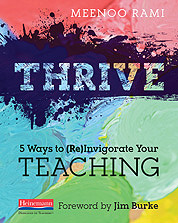
Though I first met Meenoo Rami before a National Writing Project retreat in January 2011, it was over that long weekend that my wife, Sara, and I were able to talk with her about a new venture she was beginning, #engchat. I was intrigued by her idea that a weekly chat could be something interesting and useful for English teachers, many of whom were still brand new to Twitter. I knew right away that this would be the first of many conversations with Meenoo, and the past three years have proved me right. Since that conversation, I have hosted #engchat a few times myself, and given it a shoutout at many professional conferences. So, last fall when Meenoo asked me to “blurb” her upcoming book, Thrive, and I gladly obliged. Here is what I’ve already said:
“Meenoo Rami has written the right book at the right time. In an era of corporate education reform, Thrive reminds us of how we, as teachers, need human interaction, intellectual fulfillment, and empathy just as much as our students. Rami encourages us to move beyond the mechanical acts of scripted schooling and mandatory professional development, offering us numerous ways to pursue our own passions and bring them to the classroom. She notes that “the rewards of this work will be paid with your students’ success and engagement.” Filled with practical suggestions, stories from fellow educators, and smart questions, Thrive will reward you as a reader, too.”
—Troy Hicks, author of Crafting Digital Writing
And, now, I want to add one more thing.

I recently asked Meenoo to share her thoughts on this question: “As a digital writer yourself, most notably through your blog and via Twitter, what specific lessons have you learned about digital writing that transfer back to your own students as you teach them how to be better writers?” Her thoughts, as always, demonstrate her compassion and dedication to her students:
There are several things I have learned that have helped me to become a better teacher of writing by actually doing some writing of my own:
Overcoming fear: Whether you share your work with one other person, keep a public blog, or never go beyond writing in a journal, I have come to appreciate how difficult it can be for students to share their work. I am even more committed to building a safe space for writers in my classroom after going through an intense writing period in my life where I worried about doing my best to articulate the ideas that meant so much to me.
Building trust: I think it is so important for me to earn my students trust so that they can share their struggles and fears when it comes to writing. I think I can also earn their trust by being more open about own writing process with them. Writing in front of my students, as I have learned to do so from Kelly Gallagher has fundamentally changed my classroom. I think when my students see me grapple with things in my own writing, they tend to trust me more when I give feedback.
Information vs. Stories: There is no dearth of information in our age today, however, I think we need to think about helping students shape stories out that abundance of information. We readily buy into the idea of the power stories in shaping us, I think we need than take the next step and help our students shape powerful stories based on their experiences and inquiries.
So, if it isn’t clear yet, I would strongly encourage you to get Thrive. In interest of full disclosure, I am a Heinemann author, too, and received a digital pre-print version of the book in order to write the review. Still, I am going to be happy to buy my own copy, and share with my colleagues this summer as well. I hope you do, too.
 This work is licensed under a Creative Commons Attribution-NonCommercial-ShareAlike 4.0 International License.
This work is licensed under a Creative Commons Attribution-NonCommercial-ShareAlike 4.0 International License.

The blogs and Twitter are all a buzz about this book. How exciting to have someone write what we educators are thinking. I plan to put Thrive on my summer reading list. We need more people like you and Meeno to offer us hope in this test-happy time. Thanks!
The idea that educators are collaborating over Twitter to bring new, innovative ways of teaching to classrooms across the world is amazing. This is what social media is meant for. A notion I tend to live by in regards to social media is that it doesn’t matter how many likes or followers you have, engagement is the key!
Love that this is going on and hope to hear more about it in the future!
Brendon
Hi Troy!
I was wondering if you could elaborate on this quote from Meenoo in your post:
Information vs. Stories: There is no dearth of information in our age today, however, I think we need to think about helping students shape stories out that abundance of information. We readily buy into the idea of the power stories in shaping us, I think we need than take the next step and help our students shape powerful stories based on their experiences and inquiries.
I’m just curious what this looks like as an actual assignment or project. Where you take a research unit, but instead of having kids write research papers they instead tell a story about what they’ve learned. Is that what she is getting at? And if so, I’d love to see what she does exactly.
Hope all is well! George
Hi George,
Thanks, that’s a good question. I do think that Meenoo is connecting the idea of narrative genres as a component of a research-based essay. For instance, they may build in facts and details (from students’ research) to a narrative piece, such as a memoir. I would strongly encourage you to check in with her, too, either through her website or Twitter.
http://meenoorami.org/
https://twitter.com/meenoorami
Thanks again for sharing your students’ films. I continue to use them in workshops all the time.
Troy